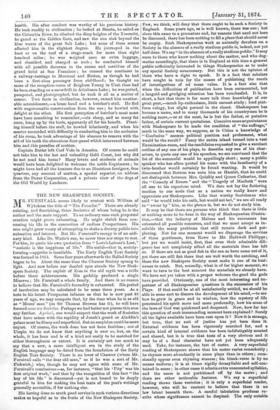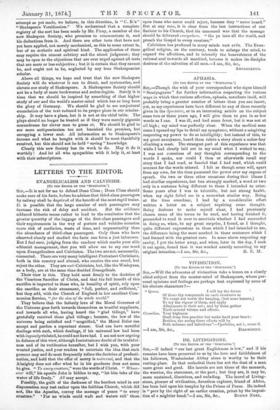THE NEW SHARSPERE SOCIETY.
MR. FURNIVALL seems likely to contest with William of Wykeham the title of "The Founder." There are already existing, and flourishing, three Societies of whose being he is the author and the main support. To an ordinary man such perpetual creation might prove exhausting. He might shrink from con- suming his life in the concoction of endless Prospectuses. His arm might grow weary of attempting to shake a drowsy public into animation and interest. But Mr. Furnivall's energy is of no ordi- nary kind. Like Dr. Watts's sun, he never tires nor stops to rest. For him, to quote his own quotation from " Love's Labour's Lost," " societie is the happiness of life." His social—that is, society- forming—appetite is insatiable. The Early English Text Society was formed in 1864. Some four years afterwards the Ballad Society began to be. About the same time the Chaucer Society sprang to light. And now before our dazzled eyes stands the New Shak- spere Society. The exploit of Zeus in the old myth was a trifle before these achievements. His godship produced a single Minerva ; Mr. Furnivall a whole family. And there is no reason to believe that Mr. Furnivall's fecundity is exhausted. His period of incubation may be calculated to be some three years. As a note in his latest Prospectus informs us that he is now past 48 years of age, we may compute that, by the time when he is as old as " Moses' man" (so Sir Thomas Browne has it), he will have formed some ten Societies. Perhaps we had better not pursue this sum any further. A priori, one would suspect that the work of Societies that have arisen with the rapidity of Jonah's gourd or Aladdin's palace must be flimsy and superficial. But no suspicion could be more unjust. Of course, the work done has not been faultless ; out of Utopia we do not know that anything is ever so, but, on the whole, it has been and is of a kind not easily to be matched for tither thoroughness or extent. It is certainly not too much to say that a new, a more intelligent era in the study of the English language may be dated from the foundation of the Early English Text Society. There is no lover of Chaucer (whom Mr. Furnivall calls " the dear old man," as if he was a sort of Mr. Pickwick,) who, though he may not agree with some of Mr. Furnivall's conclusions—as, for instance, "that his 'Pity' was his first original work," and that by the recognition of this fact "the key of his life " is discovered—yet is not bound to be deeply grateful to him for making the best texts of the poet's writings generally accessible, if for nothing else.
His having done so much good service in such various directions makes us hopeful as to the fruits of the New Shakspere Society.
Few, we think, will deny that there ought to be such a Society in England. Some years ago, as is well known, there was one ; but since this came to a premature end, for reasons that need not here be discussed, there has been nothing to fill a place that should never be empty. Such Shakespearian work as naturally devolves on a Society in the absence of a really studious public is, indeed, not yet half done. We say " in the absence of a really studious public." It may seem to those who know nothing about the matter, and who dog- matise accordingly, that there is in England at this time a general public sufficiently interested in things Shakespearian as to make any special Society unnecessary. But this is not the opinion of those who have -a right to speak. It is a fact that scholars have sought in vain for the means of publishing the result of investigations of no mean value. It is a fact also that when the difficulties of publication have been surmounted, but a languid and grudging attention has been vouchsafed. It is, in short, a fact that there is far more talk than knowledge of our great poet,—much lip-enthusiasm, little earnest study ; loud plat- form eulogy, but slight perusal in the closet. Shakespeare has become a name, and to many thousands of his countrymen he is nothing more,—or at the most, he is but the father, or putative father, of certain current quotations. Conceive some acquaintance with Shakespeare to be made the condition of "the suffrage," much in the same way, we suppose, as in China a knowledge of " Confucius" secures political position and preferment, what would be the result? Fancy the entire island turned into a vast Examination-room, and the candidates requested to give a succinct outline of any one of his plays, to describe any one of his char- acters, to quote any one of his speeches, we are convinced that the list of the successful would be appallingly short ; many a public speaker who has often quoted his name with the familiarity of a twin-brother would certainly be found wanting. It would be discovered that Bottom was unto him as Hamlet, that he could not distinguish between Mrs. Quickly and Queen Catherine, that the "Comedy of Errors " and the " Tragedy of Macbeth" were all one to his capacious mind. We dare not lay the flattering unction to our souls that as a nation we really know and appreciate our Shakespeare. Like that worthy Scotchman who said " he would take his oath, but would not bet," we are all ready to "swear by" him, as the phrase is, but we do not study him.
It may be that there are persons who think that there is little or nothing more to be done in the way of Shakespearian illustra- tion,—that the industry of Malone and his successors has exhausted all possible resources, and that we must accept as in- soluble the many problems that still remain dark and per- plexing. Not for one moment would we disparage the services of these gentlemen, from Rowe to Mr. Halliwell Phillipps ; but yet we would insist, first, that even their admirable dili- gence has not completely sifted all the materials time has left us. If there are not as good fish in the sea as have come out of it, yet there are still fish there that are well worth the catching, and these the new Shakspere Society must make it one of its busi- nesses to catch. But, secondly, what is of far higher moment, we want to turn to the best account the materials we already have. We have not yet taken with a proper welcome the good the gods have provided. Obviously, one of the most interesting and im- portant of all Shakespearian questions is the succession of his Plays. If that could be at all satisfactorily settled, we should be able in some sort to discern the development of his mind,—to see how he grew in grace and in wisdom, how the mystery of life penetrated his spirit more and more profoundly, how his sense of the laws of God was quickened and deepened. Now, how far has this question of such transcending moment been explained? Surely all the lights available have been cast upon it ? Now it is strange, but true, that no sort of justice has yet been done it. External evidence has been vigorously searched for, and a certain kind of internal evidence has been indefatigably scented and chased, but it is true that tests of a very obvious and it may be of a final character have not yet been adequately used. Take, for instance, the test of metre. A very superficial reading of Shakespeare shows that his metre varies remarkably ; he rhymes more abundantly in some plays than in others ; occa- sionally appear even rhyming stanzas ; his blank-verse is by no means uniform ; it is at times rigidly decasyllabic and self-con- tained in sense ; in other cases it admits extra unaccented syllables, and the sense is not partitioned off by the metre ; and there are other noticeable features. We say a superficial reading shows these varieties ; it is only a superficial reader, however, who will be content to believe that there is no law latent beneath them. A careful tabulation produces re- sults whose significance cannot be despised. The only notable
attempt as yet made, we believe, in this direction, is " C. B.'s" " Shakspere's Versification." We understand that a complete registry of the sort has been made by Mr. Fleay, a member of the new Shakspere Society, who promises to communicate it, and his deductions from it. And there are other tests that have not yet been applied, not merely mechanical, as this to some extent is, but of an aesthetic and spiritual kind. The application of these shay require the utmost subtlety and the nicest judgment ; they may be open to the objections that are ever urged against all tests that are more or less subjective ; but it is certain that they cannot be, and ought not to be, neglected by any true Shakespearian scholar.
Above all things, we hope and trust that the new Shakepere Society will do whatever it can to direct, and systematise, and elevate our study of Shakespeare. A Shakespeare Society should not be a body of mere bookworms and arcbm)logists. Surely it is time that we should be inspired by something of that higher study of our and the world's master-mind which has so long been the glory of Germany. We should be glad to see conjectural emendation of the text reduced to its proper place in our scholar- ship. It may have a place, but it is not at the chief table. The plays should no longer be treated as if they were merely gigantic conundrums for clever men to guess at. We should be glad to see mere antiquarianism too not banished the premises, but occupying a lower seat. All information as to Shakespeare's income and what he bought with it should be most thankfully received, but this should not be held " saving " knowledge.
Clearly this new Society has its work to do. May it do it worthily ! And let all who sympathise with it help it, at least with their subscriptions.



































 Previous page
Previous page